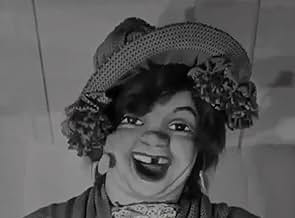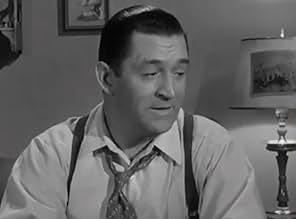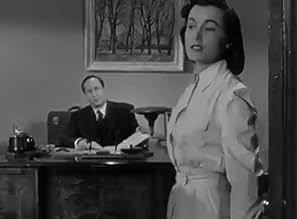अपनी भाषा में प्लॉट जोड़ेंMany interested parties are after the loot from a factory payroll heist but the mobster who hid it has amnesia after undergoing experimental brain surgery in the prison hospital.Many interested parties are after the loot from a factory payroll heist but the mobster who hid it has amnesia after undergoing experimental brain surgery in the prison hospital.Many interested parties are after the loot from a factory payroll heist but the mobster who hid it has amnesia after undergoing experimental brain surgery in the prison hospital.
Chris Alcaide
- Pursuing Detective
- (बिना क्रेडिट के)
Fred Aldrich
- Cop
- (बिना क्रेडिट के)
Leonard Bremen
- Guard at Clinic
- (बिना क्रेडिट के)
Paul Bryar
- Freddie - Bartender
- (बिना क्रेडिट के)
Sayre Dearing
- Patient in Wheelchair at Clinic
- (बिना क्रेडिट के)
Frank Fenton
- Detective Driver
- (बिना क्रेडिट के)
John Harmon
- Herman
- (बिना क्रेडिट के)
Mary Alan Hokanson
- Nurse
- (बिना क्रेडिट के)
Shepard Menken
- Interne
- (बिना क्रेडिट के)
Howard Negley
- Detective
- (बिना क्रेडिट के)
Frank O'Connor
- Gate Guard
- (बिना क्रेडिट के)
फ़ीचर्ड समीक्षाएं
After reading some negative reviews of this film, I expected it to be a pretty stale B-movie about gangsters and stolen dough. However, I found this to be a pretty entertaining B-movie with some humorous 3-D effects, and some wonderful footage of an amusement park circa 1953.
The script for this film, is indeed pretty routine with the typical gangster stereotypes seen in most films of the period. Edmund O'Brien gives a very good performance, however. There are also a few other familiar character actors in the film, which make for interesting viewing.
The 3-D gimmicks utilized throughout (scalpels, cigars, guns, a flower pot, roller coaster) are fun to spot, and good for a laugh. The greatest asset this film has though, is it's use of location filming. There is an interesting chase across some rooftops which works very well, but best of all are the amusement park scenes, including a roller coaster ride, and some really nice close-ups of the Fun House Laughing Sal figure. If for no other reason, see the film for her presence.
The script for this film, is indeed pretty routine with the typical gangster stereotypes seen in most films of the period. Edmund O'Brien gives a very good performance, however. There are also a few other familiar character actors in the film, which make for interesting viewing.
The 3-D gimmicks utilized throughout (scalpels, cigars, guns, a flower pot, roller coaster) are fun to spot, and good for a laugh. The greatest asset this film has though, is it's use of location filming. There is an interesting chase across some rooftops which works very well, but best of all are the amusement park scenes, including a roller coaster ride, and some really nice close-ups of the Fun House Laughing Sal figure. If for no other reason, see the film for her presence.
If you approach this movie with the expectation that it's a noir crime classic, you'll be disappointed. But if you come to this film for what it was at the time -- the first 3-D movie barely over an hour long, that was rushed through production to beat out a better-known movie to theater audiences -- a low budget but not cheap crime noir with snappy, clever dialogue that Tarantino wishes he wrote -- a black/white crime caper that skillfully blends backlot scenery (the rooftop chase scene must have been literally on top of the actual movie studio soundstages and offices) with Los Angeles street scenery, with genuine 1953-Lost Angeles street scenes, fashions and architecture -- all topped off with solid acting from star and superlative actor O'Brien, supported by journeymen character co-stars -- and for dessert -- the first glimpse of action choreography designed specifically to showcase the brand new 3-D technology (something we still see too much of in modern 3-D flix) -- then what we have is a movie whose parts are better than the sum total.
Oh, and did I mention the crazy fun dialogue?
If this movie is watched with an eye toward film history, then it goes from a rating of 6, to a rating of 8. This movie is a remake of a 1930s plot, then it was remade as a TV episode. Expect to see it again someday in a modern movie or tv show. It's a solid plot with all kinds of fun possibilities.
Oh, and did I mention the crazy fun dialogue?
If this movie is watched with an eye toward film history, then it goes from a rating of 6, to a rating of 8. This movie is a remake of a 1930s plot, then it was remade as a TV episode. Expect to see it again someday in a modern movie or tv show. It's a solid plot with all kinds of fun possibilities.
Edmond O'Brien stars in "Man in the Dark," a 1953 film also starring Audrey Totter. O'Brien plays Steve Rawley, a prisoner who undergoes experimental surgery that's supposed to erase the criminal elements of his brain. It also wipes his memory of past events.
Unfortunately Steve and some other thugs committed a big robbery and Steve hid the money. Now that he has no memory, he doesn't know where he put it. His old gang kidnaps him and tries to find out his hiding place. His old girlfriend Peg (Totter) is around, and she wants him to forget the whole thing and go away with her.
Steve starts remembering things in the form of bizarre dreams. He and Peg attempt to follow the clues in the dreams to track down the money.
Edmond O'Brien made a lot of these B films for Columbia. This one is no better or worse than many of them. The last part of the film takes place in an amusement park, and it's very good.
Originally this film was in 3-D, and like some other films, it was filmed in the seen-better-days area of Ocean Park near Venice, CA. I always like seeing the old LA, and this film has lots of shots of it.
I had one major problem with this film, and it's a major plot hole. If you had stolen a lot of money and hidden it, why would you agree to a surgery that is going to clean out your memory so that you don't remember where you hid it?
I don't know the answer.
Unfortunately Steve and some other thugs committed a big robbery and Steve hid the money. Now that he has no memory, he doesn't know where he put it. His old gang kidnaps him and tries to find out his hiding place. His old girlfriend Peg (Totter) is around, and she wants him to forget the whole thing and go away with her.
Steve starts remembering things in the form of bizarre dreams. He and Peg attempt to follow the clues in the dreams to track down the money.
Edmond O'Brien made a lot of these B films for Columbia. This one is no better or worse than many of them. The last part of the film takes place in an amusement park, and it's very good.
Originally this film was in 3-D, and like some other films, it was filmed in the seen-better-days area of Ocean Park near Venice, CA. I always like seeing the old LA, and this film has lots of shots of it.
I had one major problem with this film, and it's a major plot hole. If you had stolen a lot of money and hidden it, why would you agree to a surgery that is going to clean out your memory so that you don't remember where you hid it?
I don't know the answer.
7mk4
Growing up in L.A. always meant a fun trip to Pacific Ocean Park near Venice and riding the "Sea Serpent" roller coaster--and taking a whirl on the "Laff In The Dark" dark ride (while getting creeped-out by the caged "Laffing Sal" in her polka dotted dress who cackled at you from behind bars). "Man In The Dark" takes us back to 1953, and a pre-POP era, when amusement parks were generally seedy and frightening, especially Ocean Park as it was known then (POP came about after Disneyland was built in 1955, and gussied-up by CBS who had purchased it and turned it into a family-oriented theme park-by-the-sea). The "Sea Serpent"--which was "modified for family riding" by CBS in 1957-58 for the new POP, was originally known as the "High Boy"... a John Miller out-and-back masterpiece built circa 1927. This ride was a true thriller...and can be seen to full advantage in this rarely screened noir drama. Laffing Sal was there too, perched above a fun house back then, and she steals the show in many scenes shot to take full advantage of the 3-D process. Since I had experienced both parks back in the '50's through its last season in 1968 before it was torn down, I really wanted to see this movie. I wasn't disappointed. Although not up to the standards of "D.O.A." by a longshot, the movie holds one's interest from the get-go, further capturing the sleeziness old L.A. of the '50's as a place you didn't want to go to if you were trying to stay out of trouble...or if you were on the lam. Edmond O'Brien holds is own, but the other characters do seem a trifle cartoonish to be truly believable. Audrey Totter comes off a little too harsh (even for her) to be considered an attractive prize. The interior shots come off as being filmed a little too flat, but once the film goes on location to the run-down areas around Ocean Park (a real slum at the time), and the park itself, the noir experience kicks-in...Big Time! You can't really call this film a "B-Noir Classic" because its almost impossible to find today...not in the league of "Gun Crazy" (shot at Ocean Park too!) or "D.O.A" or a host of others... but Google it...and you'll find it! Then judge it for yourself.
Edmond O'Brien has a severe case of retrograde amnesia, but he didn't contract it in the Pacific. He's a robber who got away with $130,000 in a Christmas Eve heist, was convicted and served his time. But he'll get a second chance if he submits to an operation to excise the criminal portion of his brain. Understandably, he's conflicted, and when they move it up from the scheduled day he balks: `I was born on a Monday. I may as well go on one like dirty laundry.' But the operation proves a stunning success, so delicate that it erases all memories of his past life but leaves him with a perfect command of American slang.
But the placid life he leads at the sanitarium pruning hedges and daubing canvases comes to an abrupt halt when he's kidnaped by his old gang, now led by Ted De Corsia. They want the money, which was never recovered; so does an implacable Javert of an insurance investigator. Even his old girlfriend (Audrey Totter) sees him only as a ticket to the high life, until she falls for the new, improved O'Brien and renounces her grasping ways. (The often ill-used Totter shines here, especially on a martini bender when she asks the bartender, `Oh, Fred, what do you do when you hate yourself?')
Odd clues begin to surface from O'Brien's troubled nightmares, however, leading him and Totter (with the rest of the cast plus the police in pursuit) to claim a parcel left at an amusement park. And this is the big set-piece of the movie, originally released in 3-D. Cars come whooshing around the curves and down the dips of a roller coaster while pitched battles are being fought on the tracks. Watching these 3-D movies now is like drinking soda that's gone flat: All the ingredients are there but the sparkle's gone. But in their endearingly gimmicky way, they evoke their era, as do the flats equipped with party lines and furnished with lampshades bearing reproductions of paintings. Man in the Dark's too short, and needs an extra layer of complexity. But there's still a bit of fizz left in it.
But the placid life he leads at the sanitarium pruning hedges and daubing canvases comes to an abrupt halt when he's kidnaped by his old gang, now led by Ted De Corsia. They want the money, which was never recovered; so does an implacable Javert of an insurance investigator. Even his old girlfriend (Audrey Totter) sees him only as a ticket to the high life, until she falls for the new, improved O'Brien and renounces her grasping ways. (The often ill-used Totter shines here, especially on a martini bender when she asks the bartender, `Oh, Fred, what do you do when you hate yourself?')
Odd clues begin to surface from O'Brien's troubled nightmares, however, leading him and Totter (with the rest of the cast plus the police in pursuit) to claim a parcel left at an amusement park. And this is the big set-piece of the movie, originally released in 3-D. Cars come whooshing around the curves and down the dips of a roller coaster while pitched battles are being fought on the tracks. Watching these 3-D movies now is like drinking soda that's gone flat: All the ingredients are there but the sparkle's gone. But in their endearingly gimmicky way, they evoke their era, as do the flats equipped with party lines and furnished with lampshades bearing reproductions of paintings. Man in the Dark's too short, and needs an extra layer of complexity. But there's still a bit of fizz left in it.
क्या आपको पता है
- ट्रिवियाThe first 3-D feature ever released by a major American studio. House of Wax (1953) went into production first, but Columbia rushed "Man in the Dark" - shooting it in a mere 11 days - to get it into theaters just days before "Wax" opened. (Bwana Devil (1952) preceded both of them, but United Artists was not considered a major studio in the early 1950s.)
- गूफ़During the chase when Steve is abducted, one of the crooks leans out of the car and fires nine shots at the cops from a six-shot revolver.
- भाव
[first lines]
Cop: You get prettier every day.
Nurse Receptionist: Tell me about the beauty contest you won.
- इसके अलावा अन्य वर्जनOriginally released in 3D, in prints that were sepia-toned.
- कनेक्शनFeatured in TJ and the All Night Theatre: The Man Who Lived Twice (1979)
टॉप पसंद
रेटिंग देने के लिए साइन-इन करें और वैयक्तिकृत सुझावों के लिए वॉचलिस्ट करें
विवरण
- चलने की अवधि
- 1 घं 10 मि(70 min)
- पक्ष अनुपात
- 1.37 : 1
इस पेज में योगदान दें
किसी बदलाव का सुझाव दें या अनुपलब्ध कॉन्टेंट जोड़ें







































